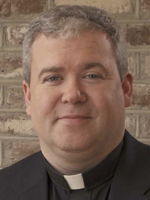Editor’s Note: This column is part of a series on death and dying.
Once, while in the parish, I was approached by a well-intentioned, non-Catholic funeral director who wanted certain things added to the funeral Mass.
When I attempted to explain why these additions were not possible, the gentleman interrupted me and asserted, “Reverend, I understand, but the funeral is for the living.”
It was an awkward moment, especially when I replied, “No, the funeral is for the dead.”
The man was speechless, and I elaborated that for Catholics the funeral is primarily an offering of prayers, and of the Eucharist, for the repose of the deceased Christian’s soul. And then, through this sacred action, the person’s family and loved ones can begin to find consolation and strength.
This encounter exposes a lot of assumptions, and some misunderstandings, about the Catholic funeral. This is true not only among our non-Catholic neighbors, but also among the faithful in the church.
Some questions should be raised: What is a Catholic funeral? How is it unique among other burial ceremonies and celebrations of life of non-Catholics? Why is the Catholic funeral significant?
The Catholic funeral is the solemn prayer and supplication of the church on earth, as a portion of the body of Christ. It seeks the mercy of God, and eternal rest and peace for one of its members, who has experienced temporal death.
In Christ, the funeral’s purpose is to assist in the Christian’s transition from this life to the next: from the church on earth, possibly through the church in purgatory, and then hopefully to the church eternally in heaven.
As the body of Christ, we pray that the Christian will rest in Abraham’s bosom and know the joys of paradise forever. The family and loved ones of the deceased Christian have a special place in this prayerful action of the whole church. While this special place is a favored participation in the communal prayer of the whole body, it does not of itself define or shape the prayer.
The funeral is best understood as a process of three stations that are meant to order and guide both the prayer for the dead and the grief and sorrow of the loved ones.
The first station is called the vigil, popularly known as the wake, and was traditionally celebrated in the family home. Perhaps celebrated in a funeral parlor now, it is still a casual and deeply family-centered time of prayer, and is meant as an opportunity for eulogies, stories and common sharing. The vigil begins the liturgical prayer for the deceased Christian.
The second station, and the central act of the body of Christ, is the Mass of Christian Burial; what most people think of as the funeral. There is an option for this prayer to be celebrated outside of Mass, but it is only to be used for serious pastoral reasons because of the power of the Eucharist in assisting the repose of the soul. This station has the eucharistic offering as the heart, and it is the focus of the entire funeral process.
The Mass expands the prayer of the family and places it within the overall prayer of the universal body of Christ. The family is now a member, and participates in the sacrifice for the deceased with all their brothers and sisters in Christ.
For this reason, the family, loved ones, funeral directors or even priests cannot alter or change, modify or accommodate the Mass to any personal or esoteric desires. Eulogies are not preferred because the focus is on the resurrection and the person’s eternal life.
The music for the funeral is to be from within the church’s tradition, and not from popular fads or cultural trends, even if favored by the deceased. Photo displays, ostentatious flower arrangements, or anything that might take away from the focus of the Mass is to be tempered or removed.
This is the prayer of the church, and not of any one person, family, or congregation. It is meant to unite the whole body, and to serve the deceased person.
The third station is the rite of committal, the graveside service. This is when the church accompanies the family to the place of burial, blesses the place of rest, and offers further prayers for the deceased Christian.
The Catholic funeral process is a time of intercession and supplication. Through these ritual acts, God’s grace is given, the departed Christian receives help, and loved ones can find consolation.

